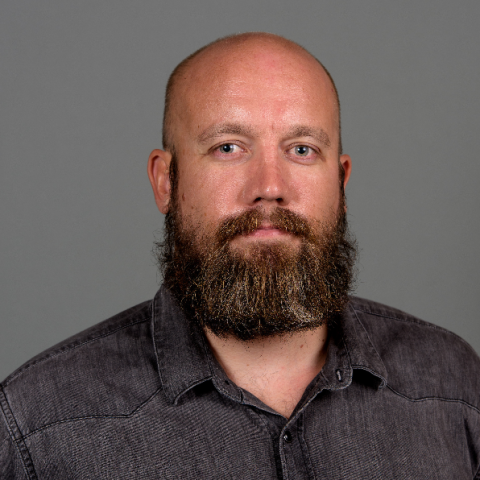
Outstanding Faculty Mentors

Jeffrey Jensen
Professor, School of Life Sciences, The College of Liberal Arts and Sciences
Biography
Jeff Jensen was born and raised in Phoenix, did his undergraduate studies at the University of Arizona in Evolutionary Biology, earned his PhD in Genetics at Cornell University, and performed postdoctoral research as an NSF Fellow at UC San Diego and UC Berkeley. Throughout this training, he was extremely fortunate to be mentored by many of the most important thinkers in Evolution, including Charles Aquadro, Doris Bachtrog, Brian Charlesworth, and Rasmus Nielsen. Prof. Jensen held faculty positions at the University of Massachusetts Medical School and the Swiss Federal Institute of Technology, prior to returning home in 2016 as a Professor in the School of Life Sciences and the Center for Evolution & Medicine.
The Jensen Lab studies theoretical and computational population genetics and evolutionary genomics, with research funded by the NIH, NSF, U.S. Department of Defense, European Research Council, and Swiss NSF, and most recently by an NIH Established-Investigator MIRA award. Prof. Jensen has mentored over 20 postdoctoral scholars to date, as well as numerous graduate and undergraduate researchers - many of whom have gone on to successful scientific careers as faculty members themselves and as research scientists in both government and industry.
Mentor Philosophy
One of the true joys of being a scientist is the ability to choose any question of
interest, and study it until a satisfactory answer is understood. A related joy of being a faculty member specifically is the ability to hand-select the team who will join these studies - identifying young scientists who can not only perform the work but also contribute to the thought, design, and interpretation, and who will modify and extend these ideas in their own novel ways. I have had the good fortune to have recruited many talented and highly-motivated lab members, and I have maintained a strong focus on mentorship and inclusion in the 12-year existence of my lab.
Of my twenty-two postdocs (twelve women and ten men), two are current, eight are now leading their own academic labs (four women and four men), and the others are split between industry, government, and further academic training positions.
When a new lab member arrives, we discuss what we would mutually like to
accomplish, and later in their studies I encourage them to develop senior-authored projects, building the foundation for their own research programs. Apart from the science, we regularly discuss strategies and approaches to successfully build their research record to the level necessary to achieve their career ambitions. This strategy has been successful. As just one example, Claudia Bank (currently a faculty member at the University of Berne (Switzerland)), turned our work together in to an important senior-authored extension at the end of her postdoctoral time in the lab (Matuszewski, Hildebrandt, Ghenu, Jensen, & Bank, Genetics 2016).
This served as a starting point from which she is now very successfully pursuing fitness
landscape inference in her own group - additionally earning a prestigious ERC Starting Grant, as well as the 2019 Allan Wilson Award from SMBE.
At the student level, I have always made undergraduate research a priority (supervising
twenty undergraduate projects to date). This allows me the ability to offer outstanding students from my courses an opportunity to experience research, but equally importantly affords my postdocs an opportunity to gain mentoring experience themselves. As the most recent examples: two exceptional undergraduate students, Emma Howell and Kellen Riall, first took my Intro Evolution course in their sophomore years, and finding a passion for the topic, next enrolled in my Population Genetics course (see below). Appreciating their interest, I invited them to conduct research projects in my group, working under the close supervision of a highly-talented current postdoc, Parul Johri. They participated in our lab meetings and journal clubs, and made significant contributions to the research projects on which they were working, each earning
authorship on a publication (Johri, Riall, Becher, Excoffier, Charlesworth & Jensen, Molecular Biology & Evolution 2021; Johri, Charlesworth, Howell, Lynch, & Jensen, Genetics 2021). Upon graduation, both went on to continue their studies in population genetic PhD programs - Emma to UW-Madison, and Kellen to the University of Chicago.
Finally, teaching is naturally another form of mentorship. At ASU, I have developed a
novel course for undergraduates and graduates alike. The primary notion of the course is
introducing students to evolutionary genetics by studying classic papers - we read
chronologically through many of the most fundamental results from the primary literature,
beginning ~1860. For students new to the field, understanding the evolution of the questions themselves leads to appreciation much more readily than simply learning the answers in a textbook. Furthermore, the early thinkers of the field were largely working with observations from nature, and thus their insights are an intuitive entry point for students. An undergraduate without any background can follow the logic outlined by Darwin and Galton. With this understood, they can see the inconsistencies in Darwin's thinking that the re-discovery of Mendel’s work resolved. Appreciating this association between Mendelian inheritance and Natural Selection thereby serves as an appropriate foundation to move in to the more complex studies of Fisher and Wright, and the birth of population genetics. This course is entirely discussion-based, the reviews have been extremely strong, and many have found an affection for these topics which have shaped their future careers.
Finally, upon moving to Arizona, I began and continue to host 'AZ PopGroup' - a meeting
held every semester uniting all evolutionary genomics labs in Arizona (~15 labs, regular
attendance of ~50 people, with representation from ASU, UofA, and NAU). This has successfully provided a forum for postdocs and students to present their work in a friendly and welcoming environment, and to receive helpful feedback and suggestion.